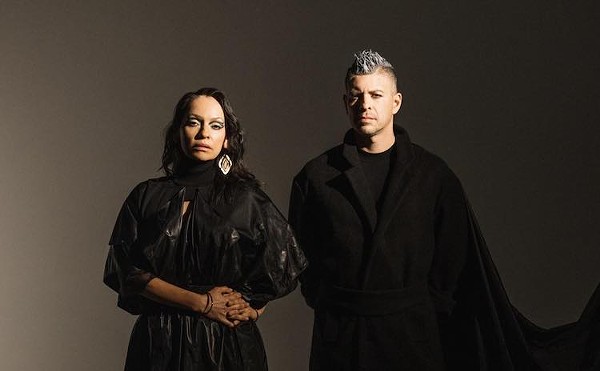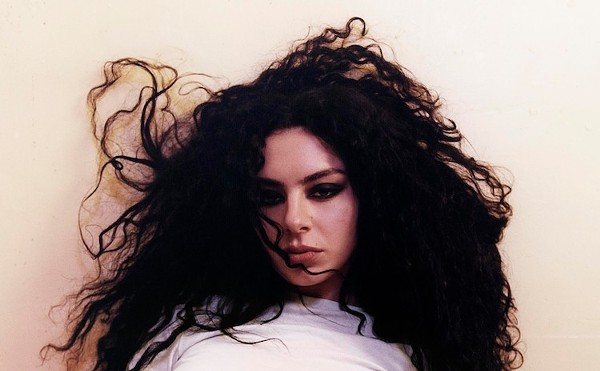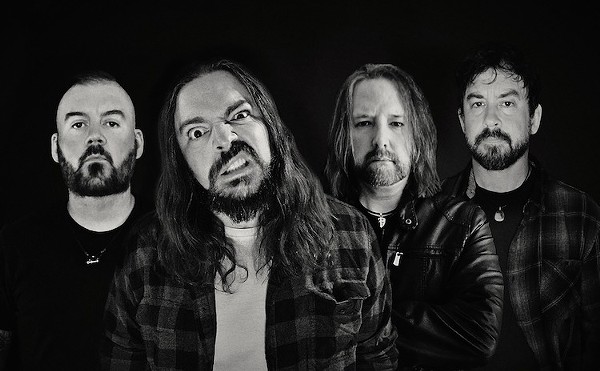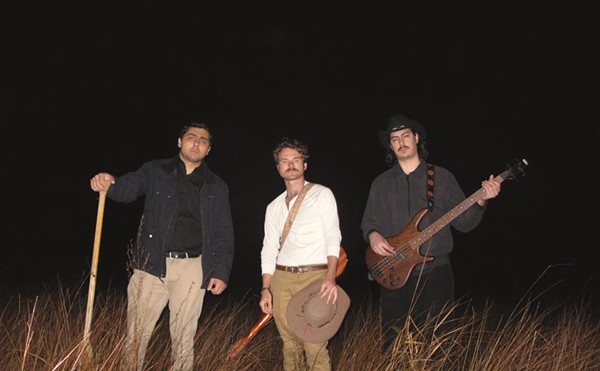The sea has rolled over and the water turned black. The sun glinting off the short, choppy waves is the only color in the void. This is the dark, haunting image that greets us on the cover of Cursive's new record, Mama, I'm Swollen, and it is a perfect indicator of what awaits inside.
Cursive has never been an easy band to get into on first listen. Slow-then-abrasive openers and nontraditional instrumentation tend to elicit a collective "huh?" on their old albums; on their more recent, themed records it takes a few listens to a song from an ugly organist or 14 hymns for the heathen for the pieces to snap into place.
Swollen is no exception, following suit with previous Cursive offerings. It's their toughest release so far, in fact, offering the least range in instrumentation since 1998's The Storms of Early Summer, before cellist Gretta Cohn joined the band and gave them a new, exciting dynamic. Though she left before 2006's Happy Hollow, a newly added horn section helped to soften the jarring blow of a changed Cursive. This time out, they're on the road with one horn and a keyboard, using alternate arrangements and reinterpretations to augment the base of their sound. The stripped-down sound is a disappointing turn for the band, until it becomes clear that it's not as raw as it seems. It's still an album only Cursive could make.
Like The Ugly Organ and Hoallow before it, Swollen begins with a short, intense opener to set up the album's themes of loneliness, regret and relationships (with people, with God) gone awry, the album cover's blood-red sun an imperious, ever-watchful eye. It's a story that continues beyond the lyrics in the album's liner notes. Written on scraps of paper, loose-leaf and even paper plates is "a series of letters the character would have perhaps written out," explains Tim Kasher, the band's frontman and author. "I just kind of got a little more lenient with how the lyrics could be written. The sequence of the album, there is a loose thread of narrative that I see the character going through.
"Around the halfway mark, I start to recognize I've been writing towards, you know, certain agendas you have, perhaps, or certain themes tend to repeat themselves," says Kasher. "It's very tempting to complete the thought."
It's a thought that's been brewing in one form or another for more than a decade and a half, through Cursive and Kasher's other bands, the Good Life and Slowdown Virginia. While not as widely known, Slowdown Virginia, a sort of nascent incarnation of Cursive, may be the more influential band. In Omaha, the band was so influential despite releasing only one album, 1994's impossible-to-find-legally Dead Space, that the local indie mega-label, Saddle Creek, reverently named their music hall "Slowdown."
If Cursive is the darker side of Kasher's imagination, it's hard to say that the Good Life is the brighter side. Over four albums and an EP, the Good Life is full of the same longing and emotional destruction as Cursive, just a mellower, more self-reflective version. But the one-Cursive-one-Good-Life pattern fans have gotten used to over the past few years may not hold true anymore. Kasher excitedly mentions his plans for a new Cursive album as soon as possible:
"We've kind of put a pin in `the Good Life` for the time being. We're not sure — we haven't made any decisions on whether we'll do another album or not," he said. "For a while there, when I was doing both bands full-time, I would be very separated, where I would only write specifically for a Cursive album, I'd finish that and I'd start a Good Life album. Over the last few years, it didn't matter if it was a Cursive or a Good Life song. I just applied it to a Cursive album."
While this level of frantic songwriting is what Kasher is known for, in the last two years he's added another hat to the rack: screenwriter. Kasher has already sold a screenplay adaptation of the Good Life's 2007 album, Help Wanted Nights, about a man whose car breaks down in a small town and who ends up learning too much about the locals, and he's written another screenplay as well.
Kasher moved to Los Angeles from his native Omaha two years ago, script in hand. "It's kind of counter to what the assumption would be of moving from Omaha to a large city. Omaha, I was born and raised there, and so I was embedded into a community there. … Living in L.A. for two years, there has been more isolation," he says, noting that at least the isolation is good for writing songs, short stories and more screenplays. "But in a general sense, I'm still writing `screenplays`, I'm just probably frustrated that I haven't started another up. I think more frustrating than that is writing them and not getting them made. On that side, I've been working harder on getting them made."
Help Wanted Nights was ready to film last fall, but after a few unexpected bumps in the road, he plans to direct it himself this summer. "It's kind of back in a good place. Hopefully, we'll get a chance to get it shot."
[email protected]
















